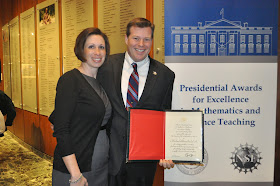The following post is posted with permission from the author,
Scott Bedley. It originally appeared on his blog,
Cutting Edge-ucation, on July 7, 2014. Scott is the 2013 IUSD Teacher of the Year, 2013 High-Tech Innovation Award winner
for STEM Education, 2014 Orange County Teacher of the Year, and a 2014 CA
State Teacher of the Year Finalist. He and his brother Tim produce the
Bedley Brothers EdChat Show, which can be found on iTunes and YouTube.
Assigning Optional Homework?
So... Should homework be required or eliminated?
A few years back, my district went through an exercise of looking at
homework and our policies surrounding it. Meetings were had,
discussions and debates occurred, and in the end... nothing much seemed
to have changed. I understand why... this is a tough issue! Homework,
after all, is truly a pillar of education. So as the debate over
homework seems to continue on like Pink Floyd's song "Comfortably Numb"
...looped..., some arguing for it and others against it, all with no
solution... I'd like to propose an optional new policy...
The Optional Homework Policy.
The optional homework policy states this... "Students, if you or your
parents would like you to complete homework, then here are your
options." Yes, giving the decision making power, to have or not have
homework, over to the students and their families. Crazy!? Will Not
Work! Kids' Scores Will Drop! Before you judge, please think growth
mindset... and know that I've actually been testing this out over the
past school year with positive results for all parties involved with the
homework debate.
There are three basic explanations/reasons why I reconsidered required or no homework:
Grades, Grades, Grades...
As teachers we have the choice to calculate homework into a grade or
not. Most teachers I know have homework as a small percentage of a
student's overall performance, yet many of the report card conversations
between teachers, parents and students, from my experience and as
shared with by many other teachers, revolve around the topic of missing
or late homework. Now I don't believe that something should be changed
to avoid a conversation, but these conversations can often become
distractors or points of contention between parent and student, student
and teacher, and teacher and parent, thus creating problems in
partnerships that are vital to real learning. These homework
conversations are another draw away from the important conversation
about learning, true student needs, and areas of growth.
The important question to ask oneself about homework grades is why is it
being given? The typical answer would be work completion, practice of
concepts or responsibility at primary levels, and preparation at the
higher levels. Most don't say that the primary or important factor in
homework is as a diagnostic tool to report to parents on a students
ability or performance. There's too many variables that impact homework
to use it as a diagnostic for student learning or as a tool to help
guide future lessons and instruction. When homework becomes optional
though, the feedback, and not the grade, become more important to the
learner. Feedback is how we learn. I've seen the focus shift and
become about the quality rather than the completion. So rather than
giving grades based on completion of work, grades can continue to move
towards being about reporting levels of learning growth.
Help or lack of it
It's a "Goldie Locks" deal... some get too much, some not enough and
others just the right amount. While parents and teachers are often on
one side or the other in this debate, the optional homework policy
pleases all. Ideally the parents who may offer too much help to a child,
thus taking away their chance to feel the success that builds
confidence, find that their help (which is at times aimed at grades)
becomes obsolete and the focus shifts to supporting a child's learning.
Fewer conflicts occur between child and parent and student and teacher.
On the other hand, the student that always struggles with homework,
and comes to our learning environments already with a feeling of
failure, now is far more open to learning.
Real Impact?
On a study my teaching partners and I did in 2007, surrounding
homework's true impact, we found that through a comparison based in
data, the students who received less homework (in the subject area of
math for our study) had three key factors surface. First, parents
reported better relationships with these children. Next, students
positive attitudes and feelings towards learning and school showed a
measurable increase as well as in-class focus and participation based on
surveys and observable evidence by two outside teachers watching the
three groups in class for engagement and effort. Finally, the group who
received the least amount of homework, actually showed the highest
percentage of gains from pre-assessment to post assessment on the math
concepts. Again, with the number of variables, I can't say beyond doubt
that homework or lack of it, was the factor that truly made the
difference, but it did play a key factor.
Still not convinced... Me either
My main hope is to "get you up on the fence" about this topic so you can
look down on both sides and clearly evaluate homework requirement
practices and why they are in place. One quote that sticks with me came
from some of the additional video content from the movie
Race to Nowhere.
"
Homework may be the greatest single extinguisher of children's curiosity that we have yet invented..."
So, where do our fears as educators and in education lie with letting go
of homework? Are we giving homework because it's always been done or
because it makes a positive impact? If you believe it makes a positive
impact, what real concrete proof do you have that it's the homework
providing this improvement?
I write this blog only to encourage you to question things that have
always been... I hope you'll question some norms... maybe even check out
my previous post titled "Subversive Education Unconference Style"
My Steps and Results
So what did I do to make homework optional? Well... when I change things
I don't only consider the implementation I will make, but I consider
"will others be able to do this too?" Confession... This isn't for
everyone. Baiscally I took the assignments I would normally assign and
said... "This is optional..." after all, I have no foundational
research to show homework was actually beneficial, so how could I
justify continuing a required practice that no one could prove even
worked after decades and decades of research and debate. So rather than
stop giving it, or continuing to require it... I made it optional
leaving the decision to the parents and students.
How has my experiment gone? First, please know I wouldn't have tested
this without the data from the study we did in 2007 and a great deal of
research... but it's been great!
One of the most positive outcomes
I've seen is that it's pushed me as an educator to continue create
in-class assignments that drive kids to want to continue their learning
on their own at home, intrinsically, by choice. It's so rewarding to
have my students have the desire to learn more about a subject I'm
teaching, because it's one of the main reasons I went into teaching...
to inspire my students to learn. In addition, many students who have
wilted under "required homework" policies have started to blossom and
come to life as learners in my subject areas. I can't say beyond a
doubt that
The Optional Homework Policy has alone created the
success and desire to learn I've seen, as I'm always trying new ways to
inspire my students to learn, but I do feel confident it's been a key
contributing factor to success for both my students and myself.
I'd love to hear your thoughts on the issue.
Are you going to try
The Optional Homework Policy? Tweet at me or
comment to let me know. My next action step... student choice
self-assigned homework. I'll let you know how it goes...
Additional reading on the homework debate that's gone on since the early 1900's
ACSD's look at Homework through the 20th and 21st Centuries
Thanks so much for reading! With my best hopes for you and your students!























































